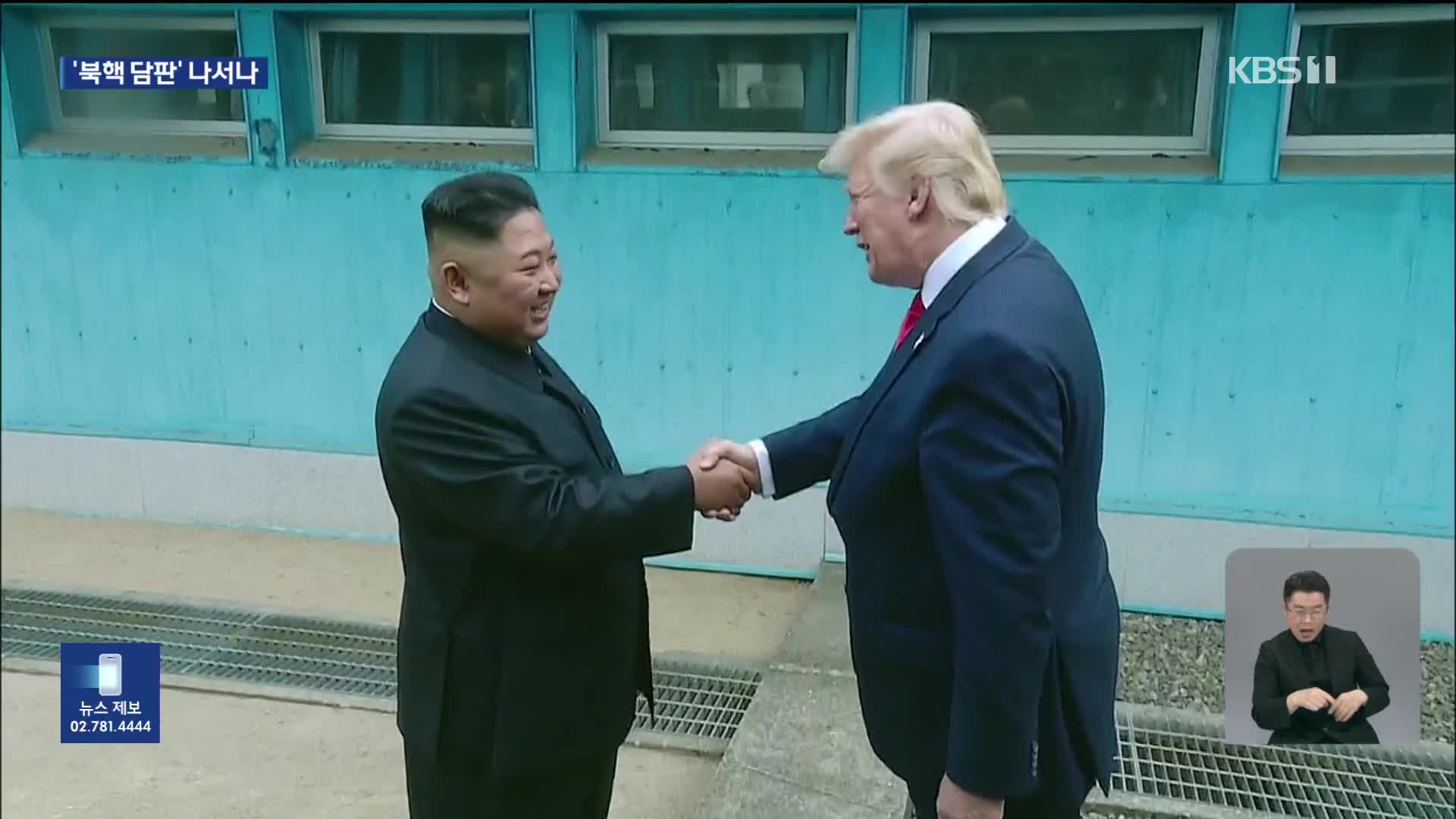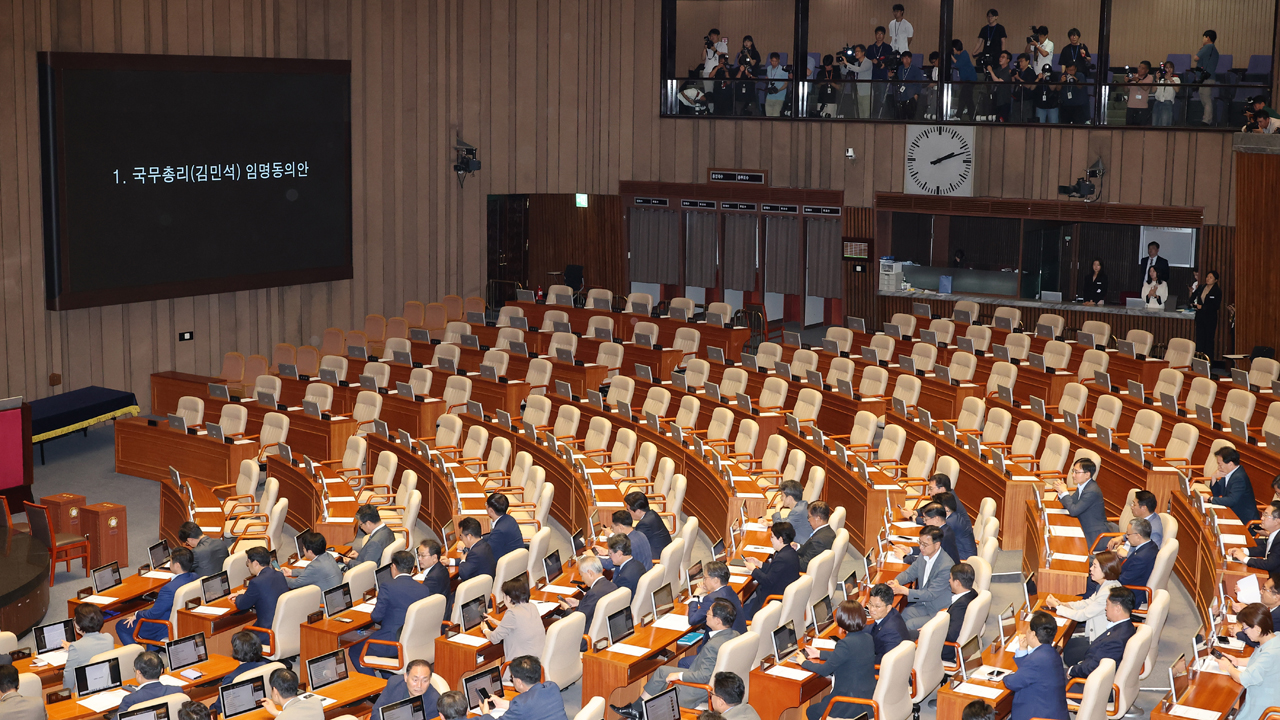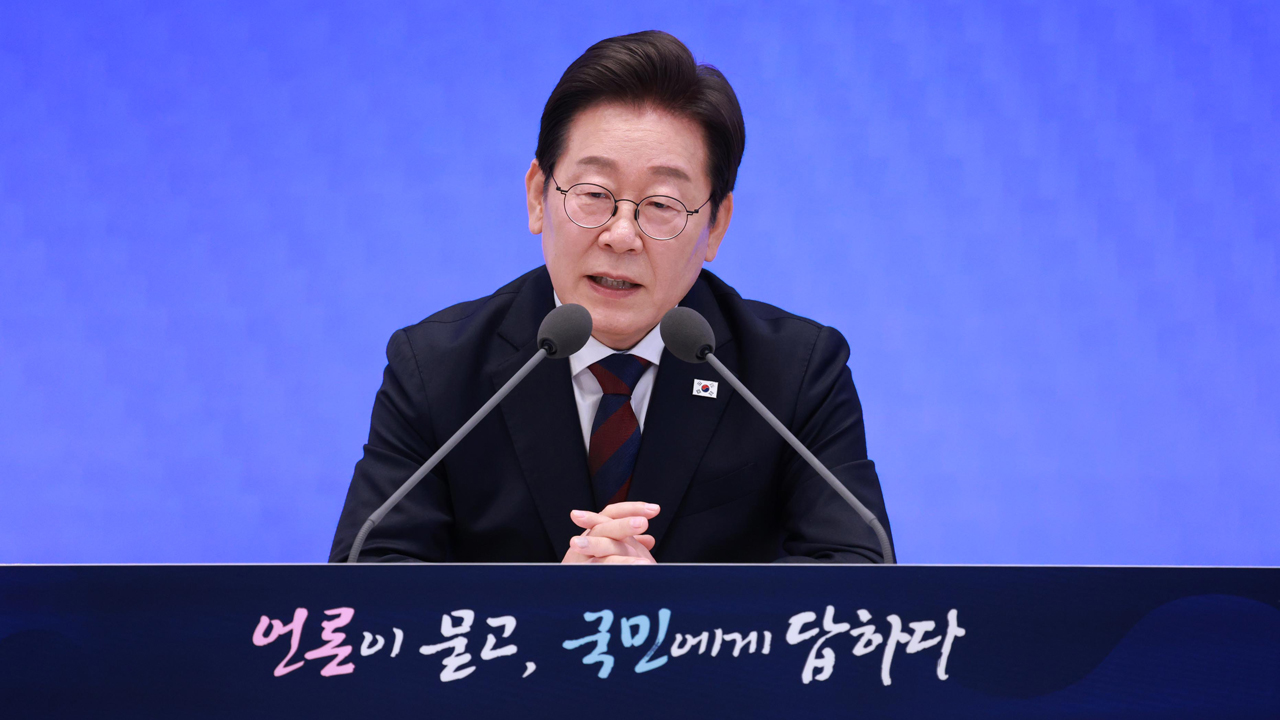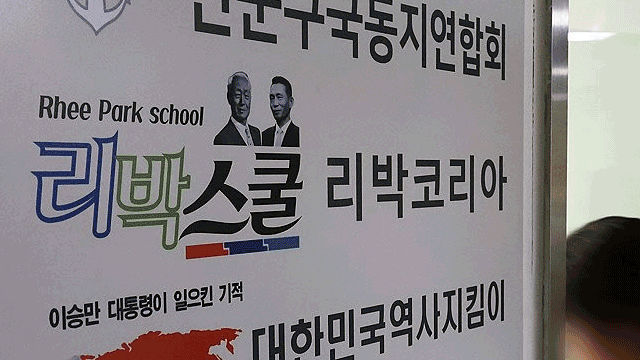Trump's re-election could reshape N. Korea policy and S. Korean security
입력 2024.11.07 (00:22)
읽어주기 기능은 크롬기반의
브라우저에서만 사용하실 수 있습니다.
[Anchor]
We will examine what impact Trump's potential re-election could have on our security sector.
Former President Trump has emphasized his friendship with North Korean leader Kim Jong-un even during his campaign rallies.
There are speculations that he may engage in direct talks again to resolve the North Korean nuclear issue.
First, reporter Go Eun-hee has the story.
[Report]
Former President Donald Trump met with Chairman Kim Jong-un three times, starting with the 'summit of the century' held in Singapore in 2018, followed by meetings in Hanoi, Vietnam, and Panmunjom.
The two exchanged over 20 personal letters, and Trump has continued to highlight his friendship with Kim even after leaving office, hinting at the possibility of North American dialogue if he were to be re-elected.
The North's recent unveiling of high-enriched uranium production facilities and strategic missile bases also raises the possibility of negotiations between North Korea and the U.S.
Since the North Korea-U.S. summit that ended without an agreement in 2019, known as the 'Hanoi No Deal,' the North has been enhancing its nuclear capabilities for the past five years.
Recently, with closer ties to Russia, the North has also strengthened its negotiating power against the U.S., and it may pressure North American dialogue through additional provocations such as nuclear tests.
However, with pressing diplomatic and security issues such as the situation in the Middle East and the war in Ukraine, denuclearization of the regime may not be a top priority for a second Trump administration.
[Hong Min/Senior Research Fellow, Korea Institute for National Unification: "I believe that within the context of a new Cold War or a multipolar structure, North Korea and the U.S. will not hastily engage in negotiations without certain guarantees. Initially, there is a high possibility that there will be significant power struggles or exploratory maneuvers."]
Additionally, there are concerns that Trump may retreat from the goal of 'complete denuclearization' of the North that the U.S.-South Korea alliance has pursued in order to achieve visible results.
In this case, there is also speculation that the U.S. may pursue a so-called 'small deal,' settling for 'partial denuclearization' of the North Korea.
This is KBS News, Go Eun-hee.
We will examine what impact Trump's potential re-election could have on our security sector.
Former President Trump has emphasized his friendship with North Korean leader Kim Jong-un even during his campaign rallies.
There are speculations that he may engage in direct talks again to resolve the North Korean nuclear issue.
First, reporter Go Eun-hee has the story.
[Report]
Former President Donald Trump met with Chairman Kim Jong-un three times, starting with the 'summit of the century' held in Singapore in 2018, followed by meetings in Hanoi, Vietnam, and Panmunjom.
The two exchanged over 20 personal letters, and Trump has continued to highlight his friendship with Kim even after leaving office, hinting at the possibility of North American dialogue if he were to be re-elected.
The North's recent unveiling of high-enriched uranium production facilities and strategic missile bases also raises the possibility of negotiations between North Korea and the U.S.
Since the North Korea-U.S. summit that ended without an agreement in 2019, known as the 'Hanoi No Deal,' the North has been enhancing its nuclear capabilities for the past five years.
Recently, with closer ties to Russia, the North has also strengthened its negotiating power against the U.S., and it may pressure North American dialogue through additional provocations such as nuclear tests.
However, with pressing diplomatic and security issues such as the situation in the Middle East and the war in Ukraine, denuclearization of the regime may not be a top priority for a second Trump administration.
[Hong Min/Senior Research Fellow, Korea Institute for National Unification: "I believe that within the context of a new Cold War or a multipolar structure, North Korea and the U.S. will not hastily engage in negotiations without certain guarantees. Initially, there is a high possibility that there will be significant power struggles or exploratory maneuvers."]
Additionally, there are concerns that Trump may retreat from the goal of 'complete denuclearization' of the North that the U.S.-South Korea alliance has pursued in order to achieve visible results.
In this case, there is also speculation that the U.S. may pursue a so-called 'small deal,' settling for 'partial denuclearization' of the North Korea.
This is KBS News, Go Eun-hee.
■ 제보하기
▷ 카카오톡 : 'KBS제보' 검색, 채널 추가
▷ 전화 : 02-781-1234, 4444
▷ 이메일 : kbs1234@kbs.co.kr
▷ 유튜브, 네이버, 카카오에서도 KBS뉴스를 구독해주세요!
- Trump's re-election could reshape N. Korea policy and S. Korean security
-
- 입력 2024-11-07 00:22:07

[Anchor]
We will examine what impact Trump's potential re-election could have on our security sector.
Former President Trump has emphasized his friendship with North Korean leader Kim Jong-un even during his campaign rallies.
There are speculations that he may engage in direct talks again to resolve the North Korean nuclear issue.
First, reporter Go Eun-hee has the story.
[Report]
Former President Donald Trump met with Chairman Kim Jong-un three times, starting with the 'summit of the century' held in Singapore in 2018, followed by meetings in Hanoi, Vietnam, and Panmunjom.
The two exchanged over 20 personal letters, and Trump has continued to highlight his friendship with Kim even after leaving office, hinting at the possibility of North American dialogue if he were to be re-elected.
The North's recent unveiling of high-enriched uranium production facilities and strategic missile bases also raises the possibility of negotiations between North Korea and the U.S.
Since the North Korea-U.S. summit that ended without an agreement in 2019, known as the 'Hanoi No Deal,' the North has been enhancing its nuclear capabilities for the past five years.
Recently, with closer ties to Russia, the North has also strengthened its negotiating power against the U.S., and it may pressure North American dialogue through additional provocations such as nuclear tests.
However, with pressing diplomatic and security issues such as the situation in the Middle East and the war in Ukraine, denuclearization of the regime may not be a top priority for a second Trump administration.
[Hong Min/Senior Research Fellow, Korea Institute for National Unification: "I believe that within the context of a new Cold War or a multipolar structure, North Korea and the U.S. will not hastily engage in negotiations without certain guarantees. Initially, there is a high possibility that there will be significant power struggles or exploratory maneuvers."]
Additionally, there are concerns that Trump may retreat from the goal of 'complete denuclearization' of the North that the U.S.-South Korea alliance has pursued in order to achieve visible results.
In this case, there is also speculation that the U.S. may pursue a so-called 'small deal,' settling for 'partial denuclearization' of the North Korea.
This is KBS News, Go Eun-hee.
We will examine what impact Trump's potential re-election could have on our security sector.
Former President Trump has emphasized his friendship with North Korean leader Kim Jong-un even during his campaign rallies.
There are speculations that he may engage in direct talks again to resolve the North Korean nuclear issue.
First, reporter Go Eun-hee has the story.
[Report]
Former President Donald Trump met with Chairman Kim Jong-un three times, starting with the 'summit of the century' held in Singapore in 2018, followed by meetings in Hanoi, Vietnam, and Panmunjom.
The two exchanged over 20 personal letters, and Trump has continued to highlight his friendship with Kim even after leaving office, hinting at the possibility of North American dialogue if he were to be re-elected.
The North's recent unveiling of high-enriched uranium production facilities and strategic missile bases also raises the possibility of negotiations between North Korea and the U.S.
Since the North Korea-U.S. summit that ended without an agreement in 2019, known as the 'Hanoi No Deal,' the North has been enhancing its nuclear capabilities for the past five years.
Recently, with closer ties to Russia, the North has also strengthened its negotiating power against the U.S., and it may pressure North American dialogue through additional provocations such as nuclear tests.
However, with pressing diplomatic and security issues such as the situation in the Middle East and the war in Ukraine, denuclearization of the regime may not be a top priority for a second Trump administration.
[Hong Min/Senior Research Fellow, Korea Institute for National Unification: "I believe that within the context of a new Cold War or a multipolar structure, North Korea and the U.S. will not hastily engage in negotiations without certain guarantees. Initially, there is a high possibility that there will be significant power struggles or exploratory maneuvers."]
Additionally, there are concerns that Trump may retreat from the goal of 'complete denuclearization' of the North that the U.S.-South Korea alliance has pursued in order to achieve visible results.
In this case, there is also speculation that the U.S. may pursue a so-called 'small deal,' settling for 'partial denuclearization' of the North Korea.
This is KBS News, Go Eun-hee.
-
-

고은희 기자 ginger@kbs.co.kr
고은희 기자의 기사 모음
-
이 기사가 좋으셨다면
-
좋아요
0
-
응원해요
0
-
후속 원해요
0












![[단독] 김민석 총리, 취임 첫 일정으로 ‘송미령 반대’ 농민단체 농성장 방문](/data/news/2025/07/03/20250703_YUTdgQ.png)


이 기사에 대한 의견을 남겨주세요.